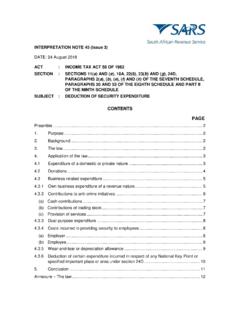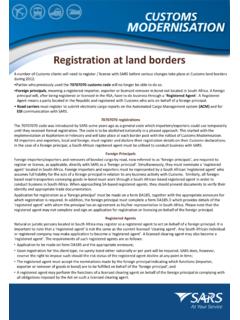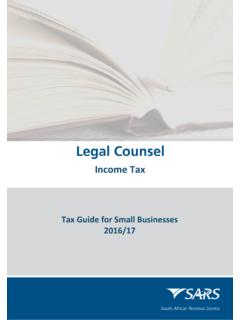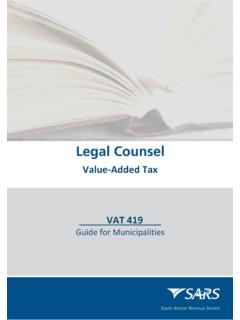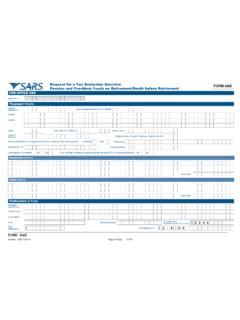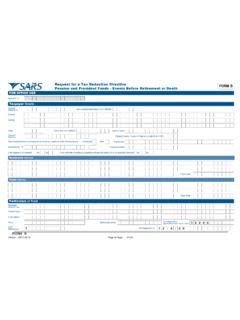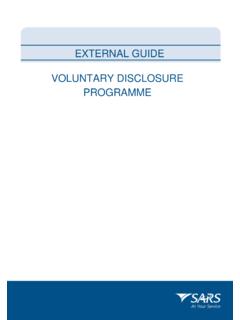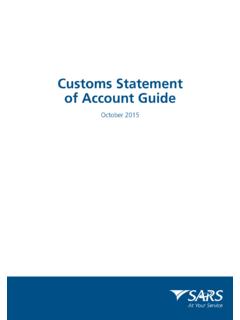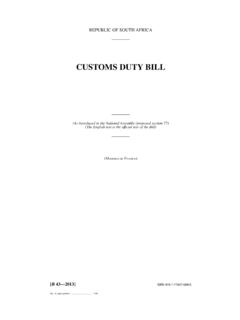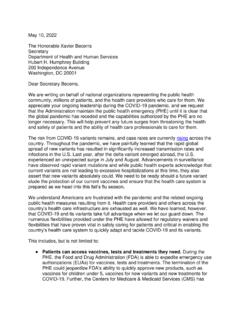Transcription of ABC of Capital Gains Tax for Individuals - SARS Home
1 ABC of Capital Gains Tax for Individuals Capital Gains Tax Issue 12 ABC of Capital Gains Tax for Individuals (Issue 12) i ABC of Capital Gains Tax for Individuals Preface This guide provides a simple introduction to Capital Gains tax (CGT) at its most basic level and contains insufficient detail to accurately determine CGT under most practical situations. It should accordingly not be used as a legal reference. It applies to the 2021 year of assessment which covers the period 1 March 2020 to 28 February 2021. For more information about CGT you may visit the SARS website at ; visit your nearest SARS branch; contact your own tax advisor or tax practitioner; contact the SARS National Contact Centre if calling locally, on 0800 00 7277; if calling from abroad , on +27 11 602 2093 (only between 8am and 4pm South African time); or consult the Comprehensive Guide to Capital Gains Tax or the Tax Guide for Share Owners, both of which are available on the SARS website.
2 Comments on this guide may be emailed to Leverage Legal Products SOUTH AFRICAN REVENUE SERVICE Date of 1st issue : October 2001 Date of 2nd issue : October 2003 Date of 3rd issue : January 2006 Date of 4th issue : 23 June 2008 Date of 5th issue : 1 April 2010 Date of 6th issue : 14 May 2012 Date of 7th issue : 5 April 2013 Date of 8th issue : 15 April 2015 Date of 9th issue : 10 February 2017 Date of 10th issue : 29 November 2018 Date of 11th issue : 11 March 2020 Date of 12th issue : 1 July 2021 ABC of Capital Gains Tax for Individuals (Issue 12) ii Contents Preface .. i 1. Introduction .. 1 2. Must a person register separately for CGT? .. 1 3. Key definitions .. 1 Asset .. 1 Disposal .. 1 Proceeds .. 2 Base cost .. 2 4. The basic 5 5. Exclusions .. 6 6. Primary residence .. 7 7. Roll-over of Capital gain or Capital loss .. 9 8. Effect of CGT on the calculation of some deductions .. 10 ABC of Capital Gains Tax for Individuals (Issue 12) 1 1.
3 Introduction Capital Gains tax (CGT) was introduced in South Africa with effect from 1 October 2001 (referred to as the valuation date ) and applies to the disposal of an asset on or after that date. All Capital Gains and Capital losses made on the disposal of assets are subject to CGT unless excluded by specific provisions. Section 26A of the Income Tax Act, 1962 (the Act) provides that a taxable Capital gain must be included in a person s taxable income. CGT is therefore not a separate tax but forms part of income tax. The Eighth Schedule to the the Act contains most of the CGT provisions which determine a taxable Capital gain or assessed Capital loss. Some provisions affecting the determination of Capital Gains and Capital losses are, however, contained in the main body of the Act, such as those relating to the death of a taxpayer, transactions between spouses and ceasing to be a resident.
4 2. Must a person register separately for CGT? No separate registration for CGT is required. Since CGT forms part of the income tax system, a person must simply declare Capital Gains and Capital losses in the annual income tax return. If the sum of a person s Capital Gains or Capital losses exceeds the annual exclusion (2021: R40 000) and the person is not registered for income tax purposes, it will be necessary to register as a taxpayer for the year of assessment in which the asset is disposed of and to complete an income tax return for that year. 3. Key definitions The Eighth Schedule provides for four key definitions (Asset, Disposal, Proceeds and Base Cost) which form the basic building blocks in determining a Capital gain or Capital loss. Asset An asset is widely defined and includes property of whatever nature, whether movable or immovable, corporeal or incorporeal and any right to, or interest in, such property.
5 Any currency is excluded from the definition of asset , but any coin made mainly from gold or platinum is included. CGT applies to all assets disposed of on or after 1 October 2001 (valuation date), regardless of whether the asset was acquired before, on, or after that date. Nevertheless, only the Capital gain or Capital loss attributable to the period on or after 1 October 2001 must be brought to account for CGT purposes. Disposal A wide meaning is given to the term disposal . The following are some examples of events that are disposals: Sale of an asset Donation of an asset Expropriation of an asset Vesting of an interest in an asset of a trust in a beneficiary Death of a person ABC of Capital Gains Tax for Individuals (Issue 12) 2 Ceasing to be a resident Loss or destruction of an asset Proceeds The amount received by or accrued to the seller on disposal of an asset constitutes the proceeds.
6 Assets disposed of by donation, for a consideration not measurable in money, or to a connected person at a non-arm s length price are treated as being disposed of for an amount received or accrued equal to the market value of the asset. The proceeds will also be equal to market value if a person dies, ceases to be a resident or is subject to a number of other deemed disposal events. Amounts included in income such as a recoupment of Capital allowances are excluded from proceeds. Base cost Broadly the determination of the base cost of an asset depends on whether the asset was acquired before 1 October 2001; on or after 1 October 2001; by donation, for a consideration not measurable in money or from a connected person at a non-arm s length price; or in consequence of a deemed disposal event such as death of a person, ceasing to be a resident or conversion of a Capital asset to trading stock.
7 Assets acquired on or after 1 October 2001 The base cost of an asset acquired on or after 1 October 2001 generally comprises the actual expenditure incurred on the asset. In order to qualify for inclusion in base cost, such expenditure must appear on the list of qualifying expenditure in paragraph 20 of the Eighth Schedule. Some of the main costs that qualify to be part of the base cost of an asset include the costs of acquisition or creation of the asset; the cost of valuing the asset for the purpose of determining a Capital gain or Capital loss; the following amounts actually incurred as expenditure directly related to the acquisition or disposal of the asset, namely the remuneration of a surveyor, valuer, auctioneer, accountant, broker, agent, consultant or legal advisor, for services rendered; transfer costs; securities transfer tax, transfer duty or similar tax or duty; advertising costs to find a seller or to find a buyer; the cost of moving that asset from one location to another; installation costs including foundations and supporting structures; donations tax limited by a formula; cost of an option used to acquire or dispose of the asset.
8 Cost of establishing, maintaining or defending a legal title to or right in the asset; ABC of Capital Gains Tax for Individuals (Issue 12) 3 cost of effecting an improvement to or enhancement of the value of the asset; and value-added tax incurred on an asset and not claimed as an input tax credit for value-added tax purposes. Holding costs Holding costs generally do not form part of the base cost of an asset. Thus, expenditure on repairs, maintenance, protection, insurance, rates and taxes, or similar expenditure is specifically excluded. Borrowing costs (including bond registration and bond cancellation costs) are also generally excluded with one exception. Under that exception one-third of the interest incurred on borrowings used to acquire listed shares and participatory interests in collective investment schemes may be added to base cost. Reduction of base cost Any expenditure referred to above which is allowable against ordinary income must be reduced in arriving at the base cost of an asset.
9 For example, Capital allowances will reduce the expenditure incurred in acquiring an asset. Assets acquired before 1 October 2001 In order to exclude the portion of the gain or loss relating to the period before 1 October 2001, a value for the asset as at that date (referred to as the valuation date value ) needs to be determined. One of the following methods may be used to determine the valuation date value of the asset: 20% (proceeds less allowable expenditure incurred on or after 1 October 2001). This method would typically be used when no records have been kept and no valuation was obtained as at 1 October 2001. Market value of the asset as at 1 October 2001. In order to use this method the asset must have been valued on or before 30 September 2004 except in the case of certain assets whose prices were published in the Government Gazette, such as South African-listed shares or participatory interests in collective investment schemes.
10 Time-apportionment base cost method. This is a method of calculating the value of the asset based on how long a person has owned it before, and on or after 1 October 2001. The calculation is done as follows: Original cost + [ (Proceeds Original cost) Number of years held before 1 October 2001 Number of years held before 1 October 2001 + number of years held on or after 1 October 2001] The proceeds used in the above formula are determined using a separate formula when improvements to an asset have been made on or after valuation date. Note: When the time-apportionment base cost method is used to determine the valuation date value of an asset as at 1 October 2001, selling expenses must be deducted from proceeds when applying the relevant formulae. ABC of Capital Gains Tax for Individuals (Issue 12) 4 Example 1 Time-apportionment base cost Facts: X, an individual, acquired a holiday home for R500 000 on 1 August 1997, that is, five years before the valuation date of 1 October 2001.
